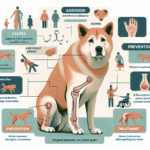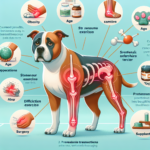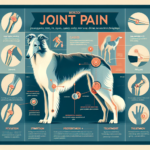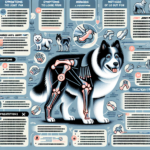Canaan Dog Joint Pain: Causes, Symptoms, Prevention, and Treatment

Introduction
The Canaan Dog is a breed with a rich history and unique characteristics. Originating from the Middle East, specifically Israel, this breed has been used for herding and guarding livestock for centuries. Known for their intelligence, agility, and loyalty, Canaan Dogs are medium-sized with a strong, square build and a dense double coat. They are highly adaptable and can thrive in various environments, making them excellent companions and working dogs.
Like many breeds, Canaan Dogs are prone to certain health issues, with joint pain being a significant concern. Joint health is crucial for maintaining the breed’s active lifestyle and overall well-being. Understanding the causes, symptoms, prevention, and treatment of joint pain in Canaan Dogs can help owners ensure their pets lead healthy, pain-free lives.
Breed-Specific Joint Pain Risks
Genetic Predisposition
Canaan Dogs, like many purebred dogs, can be genetically predisposed to joint-related issues. Common conditions include hip dysplasia, elbow dysplasia, and arthritis. Hip dysplasia occurs when the hip joint doesn’t fit together perfectly, leading to wear and tear. Elbow dysplasia involves abnormal development of the elbow joint, causing pain and lameness. Arthritis, a degenerative joint disease, can develop as a result of these conditions or independently.
Age-Related Risks
As Canaan Dogs age, the risk of joint pain increases. While they are generally healthy and robust, joint issues can become more pronounced in their senior years. Owners should be vigilant about changes in mobility and comfort, particularly as their dogs reach middle age (around 6-8 years) and beyond.
Activity Level and Joint Stress
Canaan Dogs are known for their high energy levels and need for regular exercise. While this activity is essential for their physical and mental health, it can also contribute to joint stress. Activities such as running, jumping, and herding can put significant strain on their joints, potentially leading to wear and tear over time.
Common Symptoms of Joint Pain in Canaan Dogs
General Symptoms
Owners should watch for several common symptoms of joint pain in Canaan Dogs:
- Limping or favoring one leg
- Stiffness, especially after rest
- Reluctance to move, jump, or climb stairs
- Decreased activity or playfulness
- Swelling around the joints
- Whining or showing signs of discomfort when touched
Breed-Specific Symptoms
While the general symptoms of joint pain apply to Canaan Dogs, owners might notice specific behaviors such as a reluctance to perform tasks they previously enjoyed, like herding or agility exercises. Given their history as working dogs, a sudden decrease in activity or enthusiasm for physical tasks can be a significant indicator of joint pain.
When to Consult a Vet
If any of the above symptoms are observed, it is crucial to consult a veterinarian. Early diagnosis and treatment can prevent further deterioration and improve the dog’s quality of life. Persistent limping, noticeable pain, or significant changes in behavior should prompt an immediate veterinary visit.
Preventive Measures for Joint Health
Exercise Recommendations
Regular, moderate exercise is essential for maintaining joint health in Canaan Dogs. Activities such as walking, swimming, and controlled play can help keep their joints flexible and muscles strong without causing excessive strain. Avoid high-impact activities like jumping or running on hard surfaces, especially for extended periods.
Dietary Suggestions
A balanced diet rich in essential nutrients can support joint health. Foods containing glucosamine, chondroitin, and omega-3 fatty acids are particularly beneficial. These nutrients help maintain cartilage health and reduce inflammation. Owners might consider supplements if their dog’s diet lacks these components, but it’s always best to consult a veterinarian before making any changes.
Weight Management
Maintaining a healthy weight is crucial for reducing joint stress. Excess weight can exacerbate joint issues and lead to more severe pain and mobility problems. Owners should monitor their dog’s weight and adjust their diet and exercise routine as needed to prevent obesity.
Early Screening and Monitoring
Regular veterinary check-ups and early screening for joint issues can help catch problems before they become severe. For Canaan Dogs, screening for hip and elbow dysplasia is recommended, especially if they are intended for breeding. Early detection allows for timely intervention and management strategies to be implemented.
Treatment Options for Joint Pain
Non-Surgical Treatments
Several non-surgical treatments can help manage joint pain in Canaan Dogs:
- Medications: Anti-inflammatory drugs and pain relievers can reduce pain and inflammation. Always use medications prescribed by a veterinarian.
- Physical Therapy: Exercises and therapies designed to improve joint function and reduce pain can be highly effective. Hydrotherapy, in particular, is beneficial as it allows dogs to exercise without putting weight on their joints.
- Lifestyle Adjustments: Modifying the dog’s activity level and providing a comfortable living environment can help manage pain. Soft bedding, ramps, and avoiding stairs can make a significant difference.
Surgical Options
In severe cases, surgical intervention might be necessary. Common surgeries for joint issues include:
- Hip Replacement: Replacing the damaged hip joint with an artificial one can significantly improve mobility and reduce pain.
- Arthroscopy: A minimally invasive procedure used to diagnose and treat joint problems.
- Osteotomy: Cutting and realigning bones to improve joint function and reduce pain.
Surgery should be considered a last resort after exploring all non-surgical options. A veterinarian can provide guidance on the best course of action based on the dog’s specific condition.
Alternative Therapies
Alternative therapies can complement traditional treatments and provide additional relief:
- Acupuncture: This ancient practice can help reduce pain and inflammation by stimulating specific points on the body.
- Hydrotherapy: Water-based exercises can improve joint function without putting stress on the joints.
- Massage: Regular massage can help reduce muscle tension and improve circulation, providing relief from joint pain.
Lifestyle and Management Tips
Daily Care Routine
A consistent daily care routine can help manage joint pain in Canaan Dogs:
- Provide regular, moderate exercise tailored to the dog’s abilities.
- Ensure a balanced diet with joint-supporting nutrients.
- Monitor weight and adjust diet and exercise as needed.
- Incorporate physical therapy exercises into the daily routine.
- Administer medications and supplements as prescribed by a veterinarian.
Modifying the Home Environment
Making the home environment more comfortable can significantly improve a dog’s quality of life:
- Use ramps or steps to help the dog access furniture or vehicles.
- Provide orthopedic beds to support joints during rest.
- Keep food and water bowls at a comfortable height to reduce strain.
- Avoid slippery floors or use rugs to provide better traction.
Long-Term Management
Long-term management strategies are essential for keeping a Canaan Dog active and happy despite joint pain:
- Regular veterinary check-ups to monitor joint health and adjust treatment plans as needed.
- Consistent use of prescribed medications and supplements.
- Ongoing physical therapy and alternative treatments to maintain joint function.
- Adapting activities to the dog’s abilities and avoiding high-impact exercises.
FAQs About Canaan Dogs and Joint Pain
What are the early signs of joint pain in Canaan Dogs?
Early signs include limping, stiffness, reluctance to move, and decreased activity. Owners should watch for these symptoms and consult a veterinarian if they notice any changes in their dog’s behavior or mobility.
Can joint pain in Canaan Dogs be prevented?
While it may not be entirely preventable, joint pain can be managed and minimized through regular exercise, a balanced diet, weight management, and early screening for joint issues.
Are there specific exercises that are better for Canaan Dogs with joint pain?
Low-impact exercises like walking and swimming are ideal for Canaan Dogs with joint pain. These activities help maintain joint flexibility and muscle strength without causing excessive strain.
What dietary supplements are recommended for joint health in Canaan Dogs?
Supplements containing glucosamine, chondroitin, and omega-3 fatty acids are beneficial for joint health. Always consult a veterinarian before adding supplements to your dog’s diet.
When should I consider surgery for my Canaan Dog’s joint pain?
Surgery should be considered when non-surgical treatments are no longer effective, and the dog’s quality of life is significantly impacted. A veterinarian can provide guidance on the best surgical options based on the dog’s specific condition.
Conclusion
Joint pain is a common concern for Canaan Dogs, but with proper care and management, owners can help their pets lead comfortable, active lives. Understanding the causes, symptoms, prevention, and treatment options is crucial for maintaining joint health. Regular veterinary check-ups, a balanced diet, appropriate exercise, and a supportive home environment are key components of a comprehensive joint health strategy. By taking proactive measures and consulting with veterinarians, owners can ensure their Canaan Dogs remain happy and healthy for years to come.




